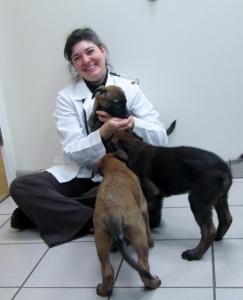How to Find a Reputable Breeder
- posted: Jul. 07, 2015

Who should you trust--your breeder or your veterinarian? How about both!
You’ve done your research and find a breeder from whom to purchase your dream dog or cat. As you leave with your new pet, the breeder hands you a list detailing foods, medications and vaccines that they do and do not recommend for your new pet. Your veterinarian looks at the information and discusses her recommendations, many of which are quite different than what the breeder suggested. Who do you trust?
Don’t get me wrong, there are plenty of excellent professional breeders who really know and love their animals and want what is best for them. But there are also breeders who are business owners first and only want to make money, and there are also many breeders who are just plain misinformed about the best vaccines, diets and medical treatments for dogs or cats. What can you do to find a reputable breeder and whose recommendations should you follow?
A reputable breeder should have his or her animals as top priority. Breeding, after all, is meant to showcase the best of the best of the particular traits of that breed and to minimize genetic disease. So, how do you know you are dealing with a responsible breeder? A good breeder will allow you to visit his home or breeding facility and see all areas and all the dogs or cats on property. The home should be clean with enough space for everyone, and the dogs or cats should be well kept and friendly. Breeding more than one or two types of dogs in one facility or having puppies available all the time should be red flags that you may not be dealing with a reputable breeder.
A good breeder should know and explain possible genetic and developmental problems associated with their breed and provide documentation that the parents are reasonably free of genetic abnormalities. A breeder who is not spending money to screen her breeding stock for potential problems is not likely to be a good breeder. Breeders should also be providing vaccination and proper veterinary care for their adult breeding animals and for the puppies or kittens.
Ask for references of those who have purchased puppies from your breeder and ask whether you can talk to her veterinarian. He or she should be willing to provide this information. The breeder should also question you to make sure you are a good fit for the breed and will provide a good home and that you will return the pet to the him if you are unable to keep it at any point. A reputable breeder should also provide a written contract and health guarantee for your pet.
A veterinarian would never presume to tell a breeder which dogs to pair to create the best puppies. Why then would you believe breeders’ medical recommendations regarding vaccinations, presumed anesthetic and drug sensitivities and strange diets when most have no actual medical experience?
No question, a good breeder may have years of experience and knowledge about her breed and potential medical problems they may encounter. And, if a breeder has documented information that dogs in their line have a true drug sensitivity or vaccine reaction, then we would certainly take that information into account. But most breeders have no actual proof of breed related drug reactions.
Your veterinarian went to school for eight or more years and had to pass a board exam in order to gain his or her license. You bring your puppy or kitten to the vet for solid medical advice. It is what you are paying us for, so please at least be open to listening to our advice during your visit. While most breeders have a wealth of information and experience about their breed, they may not be the best people to offer medical advice. Find a good breeder and a good veterinarian that you trust and take the appropriate advice from each.
This Blog brought to you by the Patton Veterinary Hospital serving Red Lion, York and the surrounding areas.
Location
Patton Veterinary Hospital
425 E Broadway
Red Lion, PA 17356
